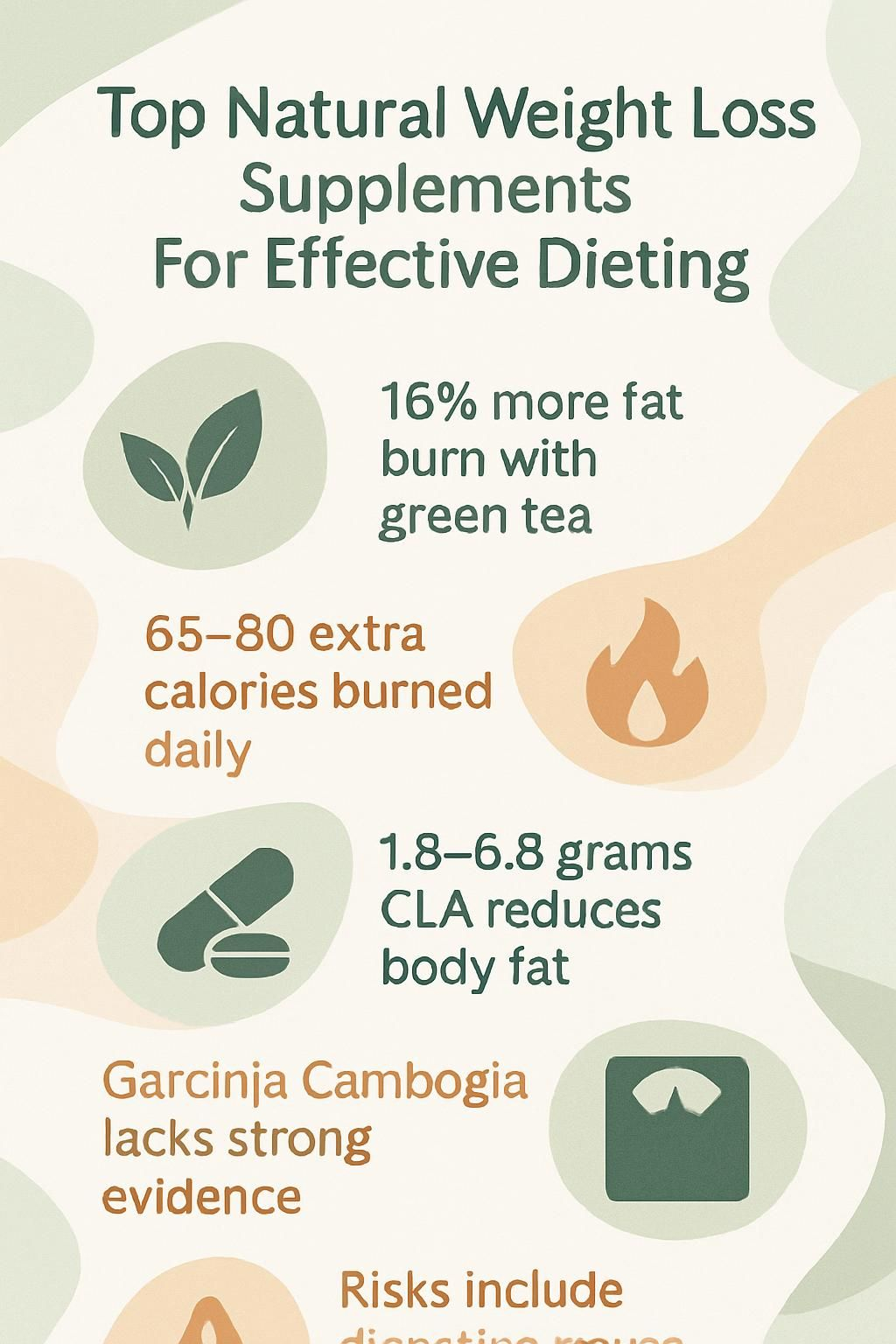Top Natural Weight Loss Supplements For Effective Dieting
Our Nutrition Assistant AI Suite will transform your body. You will lose fat, get toned, and build muscle. Gain confidence and optimal health.
You want steady progress, not quick fixes. Natural supplements for weight loss can add support to diet and exercise, yet results and safety vary a lot. This guide explains how popular options work, what research shows, and smart steps to choose safely.
Some dietary supplements for weight loss, such as green tea extract or glucomannan, may help a little with fat burning or appetite control. Others show weak benefits or carry risks. Knowing the science and the limits helps you pick what fits your plan.
Key Takeaways
- Green tea extract with caffeine raised fat burn by about 16 percent versus placebo and may help you burn 65 to 80 extra calories per day.
- Glucomannan, a soluble fiber, can boost fullness and slow digestion, but studies since 2022 report uneven results for long-term weight loss.
- CLA at 1.8 to 6.8 grams per day may reduce body fat for some, yet it can lower HDL cholesterol and raise insulin resistance in certain users.
- Garcinia Cambogia supplies hydroxycitric acid, or HCA. It may reduce appetite or block fat formation, but evidence is weak and FDA regulation is limited.
- All natural weight loss supplements can cause side effects or interact with drugs. Talk with a healthcare professional before starting any product.

How Natural Weight Loss Supplements Work

Natural weight-loss dietary supplements use plant compounds, fibers, and stimulants to support fat loss. They tend to work in four main ways: boosting metabolism, curbing appetite, speeding fat breakdown, and supporting gut health.
How do supplements boost metabolism?
Caffeine is common in weight-loss dietary supplements. It raises your basal metabolic rate, the calories your body uses at rest, by increasing chemicals called catecholamines, such as dopamine, norepinephrine, and epinephrine.
Recent research links caffeine to higher energy use and more fat oxidation, which means your body burns more fat for fuel. Green tea extract, often paired with caffeine, supports thermogenesis, the process of burning calories to produce heat. A review of six trials found that green tea with caffeine increased fat burn by about 16 percent versus placebo.
Protein powder can also help by preserving muscle during weight loss. More muscle helps keep metabolism steady. Some products like 7-keto DHEA are advertised for metabolism, yet evidence is limited.
Example: I added a higher-protein shake to a calorie-controlled plan and noticed better workout warmth and steady progress after a few weeks.
Small metabolic boosts can help while you build consistent habits around food choices, sleep, and movement.
How do supplements suppress appetite?
Many appetite suppressants use soluble dietary fiber, such as glucomannan or guar gum. Soluble fiber swells with water and forms a gel in the stomach. This slows digestion and makes you feel full longer.
Soluble fiber can increase satiety hormones like PYY and GLP-1 and may lower ghrelin, the hormone that signals hunger. Some products include plant compounds aimed at cravings, but evidence varies by ingredient. For instance, Hoodia was marketed for appetite, yet clinical support for weight loss is lacking.
Soluble fiber increases fullness and may help reduce calorie intake.
Chromium picolinate has not shown meaningful effects on appetite or weight in reviews of controlled trials. From my own test with glucomannan, late-night snacking dropped, though higher doses caused gas. Start low and go slow to judge tolerance.
Use care with fiber products like chitosan or high-dose guar gum. Too much can cause bloating or diarrhea. Some fibers also reduce absorption of medicines, so separate doses by several hours.
How do supplements enhance fat breakdown?
Fat-burning supplements, sometimes called fat burners, aim at stored body fat, also known as adipose tissue. Yohimbine blocks alpha-2 receptors, which can free more fat for burning. In one small study, 10 milligrams twice daily reduced body fat by about 2.2 percent in three weeks.
Bitter orange contains synephrine, a stimulant often used as a replacement for ephedra. It may raise energy use, but it also raises safety concerns for some users.
Green tea extract supplies EGCG, a catechin, along with caffeine. Together they support energy expenditure and fat oxidation at rest and during exercise. Caffeine alone can help mobilize fat by increasing adrenaline, which tells fat cells to release stored energy.
Some products add CLA to limit fat storage, but findings are mixed. In my trial with green coffee bean extract, I felt slightly more workout energy, yet weight changes were modest after several weeks.
Because gut health influences cravings and metabolism, supporting digestion can also help your results.
How do supplements improve gut health?
Soluble fibers like glucomannan and psyllium form a gel that slows stomach emptying and supports regularity. Many people feel fuller between meals and notice more stable hunger cues.
Glucomannan comes from the konjac root. Capsule or powder forms are safer than tablets, which can swell before reaching the stomach. Large amounts of fiber may cause gas or diarrhea and may reduce absorption of certain medicines. A common practice is to take medicines at least one hour before or four hours after fiber supplements.
Some people try apple cider vinegar to help digestion, yet recent studies have not confirmed strong benefits. Gut support pairs well with protein, hydration, and a fiber-rich diet.
Green Tea Extract
Green tea extract is one of the most studied herbal supplements for weight management. Research connects its key compounds to higher fat oxidation and small gains in daily calorie burn.
What are the weight loss benefits of green tea extract?
Green tea extract can support weight loss through thermogenesis. That means your body uses more calories to produce heat. Trials show that green tea plus caffeine increased fat burning by about 16 percent versus placebo.
Data also suggests a small boost in daily energy use, often estimated at 65 to 80 calories. The active ingredients, caffeine and EGCG, work together on energy expenditure and fat oxidation. Some people also report less appetite with regular use.
Use moderate doses. High doses may stress the liver, especially on an empty stomach. If you have liver problems, avoid use unless cleared by a clinician. Guidance from groups like the NIH Office of Dietary Supplements and Mayo Clinic supports careful, moderate intake.
What are the key active compounds in green tea extract?
Two compounds drive most effects. Caffeine raises metabolic rate by boosting catecholamines. EGCG, a powerful catechin, supports thermogenesis and fat oxidation. The combination appears more effective than either alone.
Many supplements are formulated to deliver both compounds. This is why green tea extract shows up in many weight-loss dietary supplements and fat-burning blends.
What are the pros and cons of green tea extract?
These active compounds support fat oxidation and energy use, which explains the popularity of green tea extract in weight-loss products. Review the upsides and downsides before you start.
- When combined with caffeine, green tea extract increased fat burn by about 16 percent versus placebo in research settings.
- Some data suggest 65 to 80 extra calories burned per day compared with placebo or caffeine alone.
- Moderate doses are usually well tolerated for healthy adults. I felt more alert and recovered faster after workouts while using it with a structured plan.
- Very high doses can harm the liver, especially if taken on an empty stomach. People with liver disease should avoid it and get medical advice first.
- Possible side effects include nausea, bloating, gas, diarrhea, dizziness, insomnia, or agitation, especially at high doses or when mixed with other stimulants.
- Evidence for long-term weight loss remains limited. Do not expect large or lasting changes without diet and exercise.
- Dietary supplements are not regulated like prescription drugs. Some products have hidden ingredients that can affect blood pressure and heart rate.
- If you take heart medicines or have thyroid, blood pressure, or rhythm issues, talk with a health professional before use.
Glucomannan
Glucomannan is a soluble fiber from the konjac root that can increase fullness. It may help some people eat fewer calories, though long-term weight loss results are mixed.
How does glucomannan promote satiety?
Glucomannan swells when it meets water. In the stomach it becomes a thick gel that slows digestion and helps you feel full longer. This can reduce hunger at later meals and smooth out blood sugar spikes.
Glucomannan may raise satiety hormones like PYY and GLP-1. While early studies suggested weight benefits, later reviews show inconsistent results. Drink plenty of water with each dose to reduce the risk of blockages.
I used capsules thirty minutes before meals and felt fuller, though the scale moved only a little. Results likely vary due to differences in metabolism, gut health, and insulin sensitivity.
What is the ideal usage and dosage for glucomannan?
Choose powder or capsules to lower choking risk. Avoid dry tablets, which can swell before they reach the stomach. Always take with at least 8 ounces of water.
Follow the label. A common pattern is about 1 gram three times daily before meals. Separate medicines and glucomannan because fiber can affect how some drugs are absorbed. Many people take medicines one hour before or four hours after fiber.
Do not exceed the label dose without medical guidance. Too much fiber can cause constipation or rare blockages, especially if you do not drink enough fluids.
What are the pros and cons of glucomannan?
Glucomannan may support appetite control, but it comes with cautions.
- Helps curb appetite and increase fullness, which may aid calorie control.
- Usually well tolerated in moderate amounts. Powder or capsules mix easily into daily routines.
- May reduce post-meal blood sugar spikes by slowing carbohydrate absorption.
- Evidence for meaningful long-term weight loss is inconsistent, including reviews published in 2022.
- Tablets have been linked to choking or throat blockage. Powder or capsule forms are safer.
- Gas, diarrhea, or constipation can occur with high doses or low fluid intake.
- Can reduce absorption of some medicines such as certain diabetes drugs. Get medical advice if you take prescriptions.
- Product quality varies because supplements are not regulated like drugs.
Next, see how conjugated linoleic acid may influence fat mass as part of a broader plan.
Conjugated Linoleic Acid (CLA)
Conjugated linoleic acid, or CLA, is a type of fat found in meat and dairy. As a supplement, it is marketed to reduce body fat, although results vary.
How does CLA help reduce body fat?
CLA may increase energy use and enhance fat breakdown. Some trials used doses between 1.8 and 6.8 grams daily and reported reductions in body fat for certain people. Others found little effect.
Some users feel fuller when taking CLA, which can lower calorie intake. Side effects can include nausea or loose stools. Longer use has been linked with lower HDL cholesterol and higher insulin resistance in some participants.
Because risks and responses differ, get medical guidance before starting a CLA supplement.
What are common sources of CLA?
Most diets supply small amounts of CLA from beef, lamb, butter, and dairy foods. Grass-fed animals usually provide higher levels than grain-fed animals.
Supplement capsules deliver larger, standardized doses because typical diets fall short of the amounts used in research. Many brands make CLA from linoleic acid in plant oils like safflower or sunflower.
Product quality varies. Choose brands that share third-party testing. I once added a daily softgel after reviewing dose ranges in studies, then monitored my lipids with my clinician.
What are the pros and cons of CLA?
CLA is a popular choice in weight-loss supplement stacks. Here is a balanced view.
- Several studies suggest CLA may reduce body fat at 1.8 to 6.8 grams per day for some users.
- Some people feel more satisfied after meals, which can support a structured diet plan.
- Evidence is mixed for long-term weight change. Outcomes vary widely.
- CLA may increase insulin resistance in certain users, which can affect blood sugar control.
- Lower HDL cholesterol has been reported in some trials, which could raise heart risk.
- Common side effects include upset stomach, nausea, loose stools, and fatigue.
- Supplements are not regulated like drugs. Purity and dose accuracy can vary between brands.
- Marketing claims are common, yet high-quality, long-term research is limited.
- Higher doses may raise metabolic concerns. Discuss your health status with a clinician first.
- Always review current medicines with your healthcare provider before starting any new supplement.
Garcinia Cambogia
Garcinia Cambogia is widely promoted for weight loss. Its main compound, HCA, has been studied for appetite and fat production, with mixed outcomes.
What is the active ingredient in Garcinia Cambogia and its effects?
The active ingredient in Garcinia Cambogia is hydroxycitric acid, or HCA. HCA may inhibit an enzyme involved in making fat and may reduce appetite for some users. Weight changes in trials are usually small.
Dietary supplements are not regulated like prescription drugs. Quality and purity can vary. Review all ingredients, since some formulas include stimulants or chromium.
If you use prescription medicine or have health conditions, including seizure disorders or liver disease, ask a clinician before trying Garcinia Cambogia.
What are the best practices for consuming Garcinia Cambogia?
Consult a healthcare provider first, especially if you take medicines or have a medical condition. Pair the supplement, if used, with a balanced diet and regular activity.
Choose brands that share third-party testing. Start at the label dose. Do not exceed it. Watch for headaches or stomach upset. I tested a low dose during a training phase and found it easier on my stomach when I paired it with fiber and consistent meals.
Use Garcinia as a small add-on. It should not be your only weight strategy.
What are the pros and cons of Garcinia Cambogia?
Garcinia Cambogia draws interest, yet findings are mixed and product quality varies.
- HCA may reduce appetite and limit fat storage, though strong evidence is lacking.
- Side effects can include digestive upset and headaches. Rare cases of liver injury have been reported.
- Some users notice fewer cravings. Responses differ widely.
- Supplements are not regulated like drugs, so quality and dosing can be inconsistent between brands.
- Weight results are usually small or uncertain in studies from 2019 to 2024.
- Best results occur with diet, exercise, and sleep routines, not with the supplement alone.
- Use extra caution if you also take other stimulants or herbal products with cardiovascular effects.
Next, see how green coffee’s chlorogenic acid may affect fat and blood sugar handling.
Green Coffee Bean Extract
Green coffee bean extract is marketed to reduce fat accumulation and support fat metabolism. It is often used alongside fiber supplements or as a stimulant-light option.
How does chlorogenic acid affect fat metabolism?
Chlorogenic acid is the key compound in green coffee bean extract. Early research suggests it can slow carbohydrate absorption in the gut. This may blunt blood sugar spikes and insulin release after meals.
Lower insulin levels can nudge the body to burn more stored fat. Lab work also points to effects on cellular pathways linked to glucose and fat metabolism. Still, supplement amounts vary by brand, so results differ.
Clinical studies show modest weight loss at best. In my test, six weeks of use without diet changes led to a two-pound loss, which is minor.
What additional health benefits does green coffee bean extract offer?
Green coffee supplies antioxidants from chlorogenic acid. Antioxidants help reduce oxidative stress, the damage caused by free radicals. The caffeine content can raise alertness, although usually less than regular coffee.
Some studies suggest possible support for metabolic health, but stronger trials are needed. Mild appetite effects are reported by some users. Results differ due to dose and product quality.
What are the pros and cons of green coffee bean extract?
Green coffee bean extract appears in many weight loss products. Here is what to weigh.
- Some users see a small drop in body weight when combined with diet changes.
- Chlorogenic acid offers antioxidant activity that supports cell protection.
- Caffeine can provide a gentle energy lift for workouts or daily tasks.
- Evidence points to minor fat-loss effects for most people.
- Clinical support for major weight loss is weak; many reviews rate benefits as limited.
- Side effects can include headaches, stomach upset, nervousness, insomnia, or irregular heart rhythms in sensitive users.
- Chlorogenic acid content varies widely between brands and batches.
- Dietary supplements are not regulated like drugs. Look for a third-party quality seal if you choose to try it.
- In my routine last year, I felt a small energy boost, but body changes were slight.
- Avoid stacking with other caffeine sources to lower the risk of side effects.
Caffeine
Caffeine can lift energy and support training. It also gives a small boost to metabolism, which may help with weight management when paired with diet and activity.
How does caffeine boost energy and metabolism?
Caffeine raises levels of catecholamines, including dopamine and norepinephrine. These signals increase basal metabolic rate, the energy you use at rest.
Evidence from human studies links caffeine to greater fat oxidation and modest calorie burn at rest. Many fat-burning supplements include caffeine for its thermogenic effect. You can get it naturally from coffee, tea, and cocoa.
I noticed better endurance on training runs after a cup of black coffee. Research also suggests that during exercise, your body uses more stored fat for fuel under moderate caffeine intake.
Summary Table: Caffeine’s Effects on Metabolism
| Effect | Detail or Statistic |
|---|---|
| Raises catecholamines | Increases dopamine and norepinephrine |
| Boosts basal metabolic rate | Supported in reviews and newer studies |
| Reduces fat stores | Shown in human research with regular use |
| Thermogenesis | More calories burned as heat |
| Enhances fat oxidation | More stored fat used during exercise |
Natural sources like coffee or tea can help you balance energy and calorie burn without high-dose pills.
What precautions should be taken for safe caffeine use?
Track your total daily intake. Many adults aim to stay under 400 milligrams per day from all sources, including coffee, tea, soda, energy drinks, and supplements.
High intake can cause insomnia, irritability, headaches, jitters, or a faster heart rate. People with heart rhythm issues, anxiety, or high blood pressure should avoid supplementation and seek medical advice first. If you plan to cut back, taper slowly to lessen withdrawal headaches and fatigue. I reduced my coffee over a week during exams, which helped me stay focused.
What are the pros and cons of caffeine?
Caffeine is widely used for energy and weight goals. It offers benefits and tradeoffs.
- Raises metabolism and daily calorie burn, even at rest.
- Can increase energy for physical activity and exercise.
- Enhances fat oxidation, helping your body use stored fat.
- Found in common foods and drinks, so access is easy.
- Late-day use can disrupt sleep and delay recovery.
- Some people develop headaches, irritability, or a rapid heartbeat with higher doses.
- Tolerance builds quickly. Over time, you may need more for the same effect.
- Can interact with medicines or worsen anxiety and high blood pressure.
- High doses are not safe for everyone. Use the lowest dose that helps.
Now that you know how caffeine helps and where it can backfire, explore berberine’s role in metabolism and insulin response.
Berberine
Berberine is a plant compound studied for blood sugar control and fat metabolism. It may support weight management when used with diet and exercise.
How does berberine affect metabolism and insulin sensitivity?
Berberine activates AMPK, an enzyme that helps control energy use in cells. Activating AMPK can raise calorie burning and improve how your body handles blood sugar.
Better insulin sensitivity helps cells use glucose more easily, which can reduce blood sugar spikes after meals. Many people notice steadier energy and fewer cravings while following a balanced routine. I saw fewer mid-afternoon snack urges when I paired berberine with daily walks and protein-rich meals.
As with any supplement, get medical guidance to check for drug interactions or health risks.
How does berberine aid weight management?
Studies suggest that adding berberine to diet and exercise can improve results more than lifestyle changes alone. Some trials report lower body mass index and smaller waist measurements.
These effects likely come from better insulin sensitivity, changes in gut bacteria, and reduced cravings. I used 500 milligrams before meals and felt more in control of portions. Your response may differ based on your health and medications.
What are the pros and cons of berberine?
Berberine can be a useful tool, but it is not a stand-alone fix.
- May lower blood sugar and improve insulin sensitivity, which supports weight control.
- Some research shows reductions in BMI and body fat when paired with diet and exercise.
- Digestive effects are possible, such as diarrhea, constipation, gas, or stomach pain, especially at higher doses.
- Dietary supplements are not regulated like drugs. Product purity and dose can vary.
- Berberine can interact with medicines, including some antibiotics and blood pressure drugs.
- Ask your healthcare provider to review your medicines before you start.
- Long-term safety data are still limited, including reports from 2022.
- Often chosen as a plant-based option when users want to avoid harsh stimulants.
- I noticed moderate appetite control after three weeks with consistent walking and balanced meals.
Apple Cider Vinegar
Apple cider vinegar is a common home remedy people use for appetite and digestion. Evidence is limited, yet some users find it helpful as part of a routine.
How does apple cider vinegar help control appetite and aid digestion?
Some people feel less hungry after taking apple cider vinegar. This may be due to slower stomach emptying, which can increase fullness. Its acidity might stimulate digestive enzymes and help break down food more smoothly.
Scientific research is mixed. In my own test, diluted vinegar before meals increased fullness a bit, but changes were modest. Use it as a small add-on, not a sole method for weight loss.
What are the best ways to use apple cider vinegar?
Use apple cider vinegar in safe, simple ways.
- Dilute 1 to 2 tablespoons in at least 8 ounces of water to protect teeth and stomach.
- Make a salad dressing with olive oil, vinegar, herbs, and salt for an easy daily use.
- Try a diluted drink before meals, starting with small amounts to test tolerance.
- Do not drink it straight. Undiluted vinegar can irritate your throat and damage enamel.
- Store in a cool, dark place to maintain quality.
- If you feel reflux or stomach pain, cut back or stop use.
- Keep intake under 2 tablespoons per day to reduce risks to teeth and potassium levels.
These steps can help you try vinegar safely while watching how your body responds.
What are the pros and cons of apple cider vinegar?
Apple cider vinegar is easy to add to meals, yet benefits are modest and individualized.
- May help some users control appetite and improve digestion.
- Simple to include in salads, marinades, or diluted drinks.
- Evidence for weight loss benefits is limited and inconsistent.
- Undiluted use can harm tooth enamel or irritate the throat.
- May trigger reflux or bloating in sensitive individuals.
- Product quality can vary since supplements are not regulated like drugs.
- Can interact with medicines, including diabetes drugs. Ask a clinician before use.
- Effects differ widely. Some people notice no change in weight.
Factors to Consider When Choosing Weight Loss Supplements
Claims can be bold. Look past hype to the label, the dose, and the evidence. A careful selection process lowers risk and supports your goals.
What safety and ingredient factors should be considered?
Check for third-party testing or quality seals. These signals show an outside lab verified identity and purity. Because supplements are not regulated like prescription drugs, some products have contained hidden stimulants or prescription drugs in the past.
Read the full ingredient list. Avoid allergens, such as shellfish in chitosan, if you are allergic. Some ingredients raise blood pressure or heart rate in sensitive users. Start with a small dose to check tolerance, and only increase if needed.
Pick brands that follow good manufacturing practices, often labeled as GMP. Look for transparent labels, clear dosing, and batch numbers. If something sounds too good to be true, it probably is.
What does scientific research say about their efficacy?
Evidence for most natural weight loss products is modest. Green tea extract, glucomannan, and CLA can help a little for certain users. Chromium picolinate often shows little to no effect in well-controlled studies.
Early studies sometimes look promising, yet larger or longer trials may not match those results. Safety issues have surfaced with some stimulants. Ephedra and some bitter orange formulas raised concerns for heart health.
I used green tea extract consistently for three months. The biggest changes came from eating more vegetables and walking daily. Supplements played a smaller role.
Summary Table
| Supplement | Effectiveness | Safety Notes |
|---|---|---|
| Green tea extract | Modest support, evidence varies | Usually safe at moderate doses |
| Glucomannan | Fullness support, weight results mixed | May cause gas or bloating |
| CLA | Possibly helpful for fat mass in some | May lower HDL or raise insulin resistance |
| Chromium picolinate | Often minimal effect | Generally safe at label doses |
| Ephedra or high-synephrine blends | Some effect reported | Safety concerns for heart and blood pressure |
How do personal health conditions impact supplement choice?
Your health history should guide your choice. Kidney disease can make high-dose chromium risky. Heart disease or high blood pressure means avoiding strong stimulants, including bitter orange products.
People with liver disease should avoid high-dose green tea extract. If you have a shellfish allergy, skip chitosan. Those with IBS or Crohn’s may react poorly to large doses of fiber. Caffeine can worsen anxiety or trigger irregular heartbeat in sensitive users.
I manage mild hypertension and noticed even small increases in caffeine could push my readings higher. Your clinician can help match options to your medical needs and prescriptions.
Risks and Limitations of Weight Loss Supplements
Natural does not mean risk free. Understanding side effects and limits protects your health and your budget.
What potential side effects should users be aware of?
Stimulants raise the most concern. Ephedra products were linked to heart attack, stroke, seizures, and even death, which led to removal from the market. Bitter orange can increase blood pressure and heart rate and has been linked, rarely, to serious events.
Caffeine from green tea or coffee extracts may cause insomnia, irritability, headaches, or heart rhythm problems. Fibers like glucomannan or guar gum can cause gas, diarrhea, or constipation. Tablets can swell and pose a choking risk without enough water.
CLA may lead to upset stomach or loose stools and may lower HDL cholesterol or increase insulin resistance with long-term use. High-dose green tea extract has caused rare liver injury. Side effects vary by person, dose, and combinations used.
Why is consulting a healthcare provider important?
A healthcare professional can flag interactions and risks that are easy to miss. Some products, such as sibutramine in the past and ephedra before removal, were tied to serious harm. The FDA has also issued alerts about products spiked with drugs.
Doctors can review your allergies, health history, and current medicines. For example, green tea extract can interact with blood thinners. Berberine can affect how your body handles certain antibiotics or blood sugar drugs.
My clinician once found that a supplement clashed with my asthma prescription, which I had overlooked. A quick review can protect your plan and your health.
Conclusion
Natural supplements for weight loss can support your goals, yet they work best with a balanced diet, regular exercise, and good sleep. Effects are usually modest and depend on the person, the dose, and the product quality.
Read labels closely, look for third-party testing, and start low to test tolerance. Your health history matters when choosing any supplement. If you are considering options like green tea extract, caffeine, or glucomannan for weight management, talk with a healthcare professional first.
Smart choices, patient habits, and steady routines are what move the scale in a safe way. Use supplements as tools, not as replacements for proven lifestyle steps.
FAQs
1. What are the most effective natural supplements for weight loss?
Several plant-based supplements show promise for supporting weight management. Green tea extract, conjugated linoleic acid, and soluble fiber like glucomannan have been studied in clinical trials. For example, a 2012 review found that green tea extract may help increase fat oxidation during exercise (Hursel et al., Obesity Reviews). Always check scientific sources before choosing any supplement.
2. Are natural weight loss supplements safe to use with a balanced diet?
Most botanical or mineral-based products are considered safe when used as directed alongside healthy eating habits. However, some ingredients can interact with medications or cause side effects such as digestive discomfort. Consulting a healthcare provider is important before starting new dietary aids.
3. How do these supplements support effective dieting?
Natural options often work by reducing appetite, increasing metabolism, or blocking fat absorption from food intake. For instance, soluble fibers expand in the stomach which helps you feel full longer; this effect can make it easier to follow calorie-controlled diets.
4. Can personal experience guide supplement choice for weight control?
Personal stories highlight how individual responses vary widely with each product type and brand quality plays a role too. I once tried glucomannan capsules while tracking my meals and noticed less hunger between breakfast and lunch compared to days without them; however, results depend on consistent use within an overall healthy lifestyle.
Summary:
Plant-derived extracts like green tea and certain fibers offer evidence-backed benefits for people seeking extra support during dieting efforts according to published research data tables and user experiences alike; always prioritize safety by consulting professionals before adding new items to your routine.






